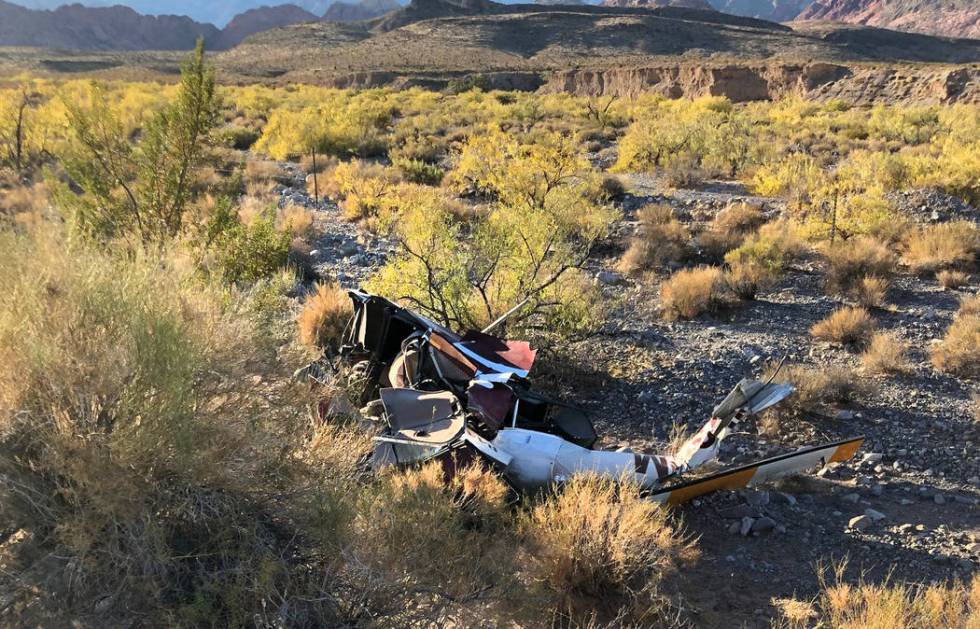NTSB: Copter had debris in fuel before fatal crash near Red Rock

A rented helicopter that crashed in the Red Rock Canyon National Conservation Area in October, killing two, was found to have sediment in its fuel on the day of the crash, according to the preliminary findings of a federal inquiry.
The helicopter was supposed to undergo maintenance by a mechanic to fix the fuel issue but it appears that did not happen, the report from the National Transportation Safety Board states.
The Oct. 23 crash of the R44 helicopter killed pilot Scott Socquet, 53, of Milford, Connecticut. Passenger Howard Jameson, 27, from New Fairfield, Connecticut, died of his injuries two days later.
The preliminary report indicates that on the day of the crash, Socquet called Airwork Las Vegas to see if a helicopter was available for rental.
“One of the schedulers responded that the helicopter was undergoing maintenance and (Socquet) stated that he would stop by the office anyways to check if the maintenance was done and put money on his account,” the report states.
Socquet and Jameson arrived at the North Las Vegas Airport about 10 minutes later.
“The pilot asked why the helicopter was in maintenance and the office personnel told him that an earlier flight was canceled because that pilot had found sediment in the fuel tanks,” the report states. “(Socquet) stated that he was happy to wait” until the repair work was done.
‘Ready to fly’
About 20 minutes later, a certified flight instructor who had canceled the earlier flight called stating “that the maintenance was done and the helicopter was ready to fly,” the report states.
Socquet and his passenger took off at 3:35 p.m. on what was expected to be an hour-long flight.
The helicopter crashed at 3:53 p.m. about 20 feet from state Route 159.
A witness riding a motorcycle on the highway told authorities “he initially saw the helicopter in the upper right-corner of his vision … in a nose-up attitude and in a very steep descent angle,” the report states. “He witnessed the helicopter impact the ravine adjacent to the road and break apart.”
Radar data showed that prior to the trash Socquet circled over a remote control airpark and the Desert Sportsman’s Rifle Club. The helicopter loosely followed the road around Calico Basin, flying about 400 feet above ground level. The helicopter made a left turn and several other maneuvers over the Red Rock Canyon National Conservation Area “including a possible touchdown where the forward airspeed was reduced to 0 knots.”
“The last 30 seconds of the track revealed the helicopter was following the road with an airspeed of about 120 to 100 knots at an altitude between 500 to 700 feet (above ground level,)” the report states.
The investigative report said Airworks received fuel from a North Las Vegas business and that the helicopter was fueled twice the day prior to the accident. A pilot being taught on the helicopter that day stated the fuel “was clean of debris and the helicopter functioned normally.”
Fuel ‘appeared dirty’
On the morning of the crash the helicopter was fueled at 7 a.m. A fueler inspected the fuel and noted it was clean. But a pilot undergoing instruction with a certified flight instructor performed preflight checks and said fuel from the main tank “appeared dirty with black and grey specs floating.” Two more samples were taken and they produced the same results. A mechanic was notified but said he was busy and would not be able to address the issue until the afternoon.
“During an interview with a Safety Board investigator, the mechanic stated he did not have an opportunity to flush the fuel tanks in the helicopter,” the report states.
Later that day the certified flight instructor canceled a planned training flight at the request of the pilot in training.
“After the flight was canceled the certified flight instructor was sumping the fuel tanks likely to ensure the tanks were clear for the accident flight,” the report states. “Despite numerous attempts, the certified flight instructor did not make a statement to (investigators) and therefore it is not known what he did to the helicopter before the flight, the fuel in the helicopter, or what he said to the accident pilot.”
An inspection of the wreckage showed no indication of catastrophic failure with the engine. Fuel screens in the chopper were clear of debris. But investigators learned that a signal system on the rotor connected to the cockpit that relied on two magnets was missing one.
“A (manufacturer representative) reported that with only one magnet in place, the main rotor tachometer RPM would indicate about 50 percent of the actual rotor rpm,” the report states.
The NTSB investigation is continuing and will ultimately lead to the issuance of a final report.
Contact Glenn Puit at gpuit@reviewjournal.com or 702-383-0390. Follow @GlennatRJ on Twitter.